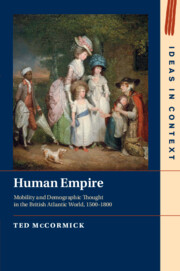Book contents
- Human Empire
- Ideas in Context
- Human Empire
- Copyright page
- Dedication
- Contents
- Acknowledgments
- Introduction Transformations in Demographic Thought
- Chapter 1 Mobility and Mutability in the Early Tudor Body Politic
- Chapter 2 Marginality, Incivility and Degeneration in Elizabethan England and Ireland
- Chapter 3 Beyond the Body Politic: Territory, Population and Colonial Projecting
- Chapter 4 Transmutation, Quantification and the Creation of Political Arithmetic
- Chapter 5 Improving Populations in the Eighteenth Century
- Conclusion Malthus, Demographic Governance and the Limits of Politics
- Afterword
- Bibliography
- Index
Conclusion - Malthus, Demographic Governance and the Limits of Politics
Published online by Cambridge University Press: 14 April 2022
- Human Empire
- Ideas in Context
- Human Empire
- Copyright page
- Dedication
- Contents
- Acknowledgments
- Introduction Transformations in Demographic Thought
- Chapter 1 Mobility and Mutability in the Early Tudor Body Politic
- Chapter 2 Marginality, Incivility and Degeneration in Elizabethan England and Ireland
- Chapter 3 Beyond the Body Politic: Territory, Population and Colonial Projecting
- Chapter 4 Transmutation, Quantification and the Creation of Political Arithmetic
- Chapter 5 Improving Populations in the Eighteenth Century
- Conclusion Malthus, Demographic Governance and the Limits of Politics
- Afterword
- Bibliography
- Index
Summary
The Conclusion reexamines Thomas Robert Malthus’s Essay on the Principle of Population from the perspective of the transformative mode of demographic governance explored throughout the earlier chapters, as well as in terms of the eighteenth-century debates about the limits and locus of demographic agency examined in Chapter 4. Rather than seeing Malthus’s Essay as marking a definitive break with earlier demographic thinking, it argues for strong continuities, particularly concerning the importance of situation, the providential nature of demographic processes and the real effects of intervention in demographic governance. Instead, it identifies Malthus’s key departure as an emphasis on the propertied and rational individual as the legitimate locus of demographic agency under God. The conclusion ends by considering some of the implications of the history of early modern demographic governance for reinterpreting – and broadening – the history of modern demographic thought.
Keywords
- Type
- Chapter
- Information
- Human EmpireMobility and Demographic Thought in the British Atlantic World, 1500–1800, pp. 235 - 251Publisher: Cambridge University PressPrint publication year: 2022

